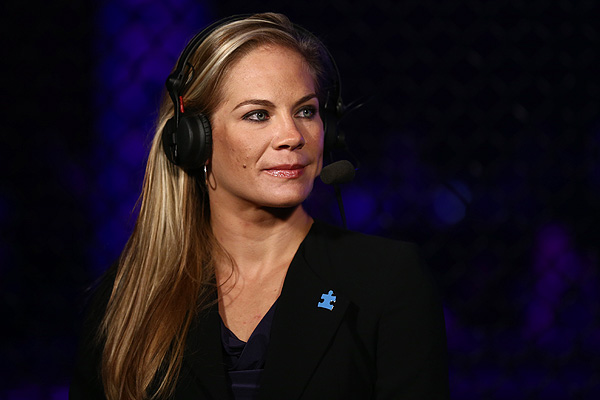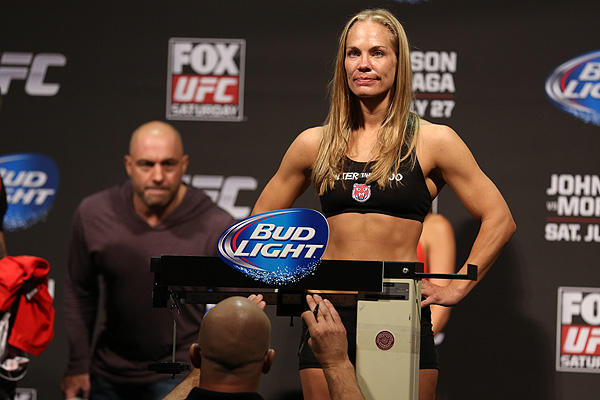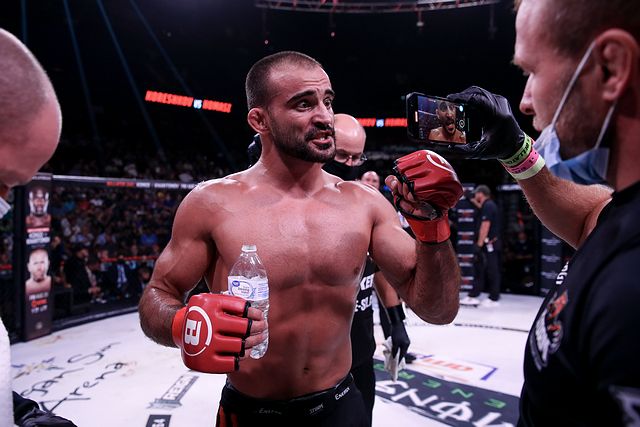Julie Kedzie: On Fighting, Writing, Missteps and Metaphors
It’s been more than five years since Julie Kedzie, AKA “Fireball,” stepped into the cage. But the MMA pioneer -- who represented one half of the first women’s bout ever televised on cable -- remains immersed in the sport in which she spent a decade competing professionally.
Advertisement
Kedzie is in the third year of the University of Iowa’s creative nonfiction Master of Arts program, and has recently submitted the first draft of her thesis. Its subject is, in Kedzie’s words, “some thoughts and feelings I have about my time as a fighter,” and her goal is for it to evolve into a full-length memoir down the track.
Sherdog.com caught up with Kedzie to talk about the project and her
journey from the locker room to the lecture hall, as well as a
range of other topical MMA issues. In a wide-ranging interview, the
38-year-old shared her thoughts and reflections on her professional
career, transitioning to academia, the Conor
McGregor - Khabib
Nurmagomedov feud and Invicta FC.

Credit: Dave Mandel
Kedzie starts by explaining the meat and potatoes of the master’s program. It’s three years; led by famed essayist John D’Agata. Kedzie’s thesis supervisor is Kerry Howley, whose 2014 book “Thrown” explored the philosophical realm of MMA competition through the lives and stories of journeyman Sean Huffman and current UFC lightweight Erik Koch. Kedzie gets much of her inspiration, if not her politics, from Joan Didian -- “Didian had ‘Slouching Towards Bethlehem,’ I suppose this is my ‘Stumbling Towards the Octagon,’” she laughs -- and her peers in the classroom can be as young as 23.
In discussing the writing process, Kedzie’s passion for her new(ish) craft is obvious and infectious. A born storyteller, who is capable of side-splitting anecdotes like her infamous poop story involving an inverted triangle and Vladmir Putin as well as poignant, empowering musings such as her 2018 essay on her historic fight with Gina Carano, Kedzie speaks glowingly about her motivations for putting pen to paper and the challenges she’s encountered on the journey.
“When you’re writing you actually have the crystallize things that you perhaps never really put into words” she explained. “It’s about communicating knowledge, and understanding the presence of the reader. Not everybody’s in my head; not everybody thinks the way that I do because I’m crazy. You have to make adjustments for audience, and [acknowledge] that what’s easy for you to understand based on your past knowledge is not necessarily easy for the rest of the world to understand. I do find that that fighting, particularly MMA, poses so many beautiful metaphors for learning and just going through life; your trials and tribulations as a human being. I think it’s really rich material.
“I want my story to be told in my way,” she continued. “Even if it’s something the people say ‘that’s not how I remember it,’ it’s told in my way; these are my thoughts and my feelings, what I was experiencing emotionally throughout my career, even it looked differently on the surface.”
Kedzie’s position in the master’s program came with eligibility for a post-graduate provost position, for which she was selected, and an abundance of additional teaching opportunities. In between workshopping her thesis, she’s teaching classes and appearing on writing panels, building her résumé for when the program finishes. As for what comes after that? Kedzie wants what she’s always wanted: autonomy.
“The idea of being able to write for a living sounds amazing,” she said. “But ultimately I’ll do whatever job it takes so that I can write; just like I did whatever I needed to so that I could fight in the beginning. There wasn’t an opportunity to fight full-time or take a paycheck from that. I worked a lot of jobs doing odd things so that I could fight. That would be how I would strive for autonomy as a writer: I would work so that I could write. It sounds exhausting, but it’s something I’m used to.”
The intersections and analogies between fighting and writing -- and between the livelihoods of fighters and writers -- are something Kedzie returns to multiple times throughout the interview. In many ways, Kedzie speaks about the latter as something that can supplement and augment her experience as the former.
“That’s the thing about being a writer -- about being a human being” she said. “Some people are fortunate enough to have an impact on the world such that people remember it, and some people have to carve theirs out a little bit. I think I’m a person that needed to carve out my [story]. People say ‘you’re a pioneer’ but I don’t really know what that means. I was one of the first women to do a couple of things in the sport, and my endgame was to become a UFC champion and to put women on equal footing in the sport. I contributed to that [effort], but not in that Gina Carano, Cris Cyborg, Ronda Rousey kind of way.”
The conversation shifts to Kedzie’s role as Invicta FC’s color commentator, a position she has held since the organization was founded in 2012. After Kedzie retired from competition in 2013, she took on matchmaking duties as well and even moved out to Kansas City for a time before eventually getting itchy feet and making her way to Iowa for the graduate program.
“I needed to go back to school,” Kedzie said of the stopover in Kansas. “It was something that I had talked to [Invicta FC President] Shannon [Knapp] about a couple of times. When my application for the University of Iowa was accepted, we initially were going to split the matchmaking duties in half [between myself and] Kaitlin Young. But this [writing] program is so rigorous, it’s incredibly hard, and I was just not contributing as a matchmaker; I said ‘I’m not doing the work, I should not be getting a paycheck for this.’ So I stepped aside, and Kaitlin took it on full-time. I stuck with the commentary, and that’s where I am now.”
“Fight week is the closest thing I get to being a fighter again” she continued. “It is a great gift to get to experience that energy… I hope to be a commentator and an analyst for that company for the rest of my life. I love it; I believe in it.”

Credit: Dave Mandel
Kedzie’s passion for women’s MMA, and determination to see female fighters achieve parity with their male counterparts, is obvious to anyone whose tuned into an Invicta FC show on UFC Fight Pass, and given Kedzie’s trailblazing status -- having fought under the EliteXC, Strikeforce and UFC banners during her time in the sport and shared the cage with likes of Carano, Miesha Tate and Germaine de Randamie -- it’s easy to see why the partnership with the promotion works. Asked whether she shared the view that the organisation was limited by its big brother-little sister relationship with the UFC, however, Kedzie’s answer was a polite but emphatic no.
“As far as Invicta as a brand, I know there’s plans for it to go well beyond MMA,” she said. “Combat sports is a huge field, and Shannon has some very strong visions for the future. At the end of the day the UFC is the best show in town. Little girls grow up saying they want to fight in the UFC -- some of them now say they want to grow up and fight in Invicta too, which is great. I don’t think there’s a limit, though, because I don’t think you can run out of human beings that want to fight in this world. I think there are always going to be fighters that want to rebuild themselves, start over.
“One of the things that happens is combat sports is that fighters get pushed too early, and they need to go back to the beginning and re-start” she elaborated. “We’ve seen so many people remake their careers in shows like Invicta, in Invicta particularly. You see somebody getting a second chance, a second chapter in their careers. So I don’t think there’s a limit on it.”
Asked what else change has surprised her most in the industry since her retirement, Kedzie has no shortage of insights, noting that the star-driven approach of the UFC -- characterised by its acclamation of Conor McGregor -- is a far cry from the brand-centric promotional philosophy she became accustomed to on her way up through the ranks.
“The UFC has kind of adopted a boxing model with its stars,” she said. “I find that very interesting, the Conor McGregor effect. I think it’s a smart strategy because they have a lot of cards, a lot of fighters, so there’s a lot of potential to build stars. I never expected that, but it makes sense to me. The UFC didn’t do it that way at first, back then it was about their brand all the time. Now that it’s become mainstream more or less – it’s on ESPN – I think the brand is established. The general public think it’s the best game in the town and so [they’ve] kind of switched over the marketing to be more star driven.”
“I dislike the extent to which they’ve [embraced] the [fighters] screaming at each other on Twitter” she continued, an obvious reference to the ongoing feud between McGregor and Khabib Nurmagomedov. “I get it, it’s building up a fight, but I think there are times when you need to pull back. I think they have to be real careful, they’re playing with fire when they go after religion, upbringing, that sort of thing. That opens up a whole new can of worms.”

Credit: Dave Mandel
The conversation drifts back to Kedzie’s time in the sport -- what she cherishes most about that time, and what, if anything, she regrets. That Kedzie has spent significant time ruminating on both through her writing is obvious by the profundity of her statements.
“I miss being on a team” she said. “I miss that camaraderie and trust. As an active competitor, you can adjust your filter towards achieving one goal, and that can put everything else in relief. There’s real life things out there that are still happening – you’re living day to day life, but with all focus on that one thing you’re trying to achieve. It can be very hard to adjust from that. It kind of figures in with autonomy and dependency I suppose.
“My main goal for my whole life is to just live an autonomous existence” she continued. “I know that’s not entirely possible. But with fighting, you’re living for a moment, 15 minutes that mean everything. And that can put too much pressure on you, I’m sure it put too much pressure on me at times, but it was also a life that was worth it, as hard as it was.”
On the topic of missteps -- moments where she should have zigged instead of zagged -- Kedzie is no less perceptive, and the interview ends with her giving something close to a pronouncement of inner peace.
“For the media I can compartmentalize, and say ‘yeah I’ve moved on,’” she said. “But the truth is that fight is a heartbreaking sport. We are human beings. I do remember the times that I messed up. A lot. But those moments are also the moments when you grow. If everything came easy, if you win every fight, what does fighting even mean? I know what sounds super clichéd or whatever. But losing, the amount of times I made bad decisions, the trust I put in people, the ways I was really super vulnerable in the fight world – that’s being a human being. It’s how it works. If you do obsess about that stuff, you have to come back to: I woke up the next day. I’m alive and still here. I still have a lot to accomplish.
“Again it sounds clichéd,” she added. “But I don’t think I’d change anything that happened in my career, except for the people that I hurt… It wasn’t me directly that got women into the UFC, but I put one of the bricks down, and I can be proud of that. And even if people forget that, I’m still proud of that, I can write about that.”
Related Articles







